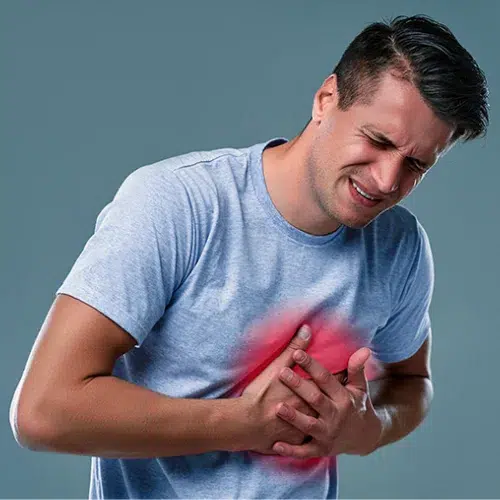Introduction
Many people often confuse heart problems with acid reflux chest pains because the discomfort can feel very similar. Acid reflux happens when stomach acid flows back into the esophagus, causing irritation and pain that sometimes feels like heart pain. Understanding the symptoms, causes, and treatments is important for your health and peace of mind. If chest pain happens suddenly or feels severe, always seek immediate care at trusted facilities like ER OF FORT WORTH, where emergency doctors can help quickly.
What is Acid Reflux?
Acid reflux occurs when the muscle at the end of your esophagus (called the lower esophageal sphincter) does not close properly. This allows stomach acid to move upward, leading to burning and pressure in the chest.
Common Terms You May Hear
-
GERD (Gastroesophageal Reflux Disease): Chronic acid reflux condition.
-
Heartburn: The burning feeling in the chest or throat.
-
Regurgitation: Sour or bitter liquid rising into the throat or mouth.
Symptoms of Acid Reflux Chest Pains
Acid reflux chest pains can vary in severity and frequency. Some people feel mild discomfort, while others have intense burning sensations.
Key Symptoms
-
Burning pain in the chest, often after eating
-
Pain that worsens when lying down or bending over
-
Bitter or sour taste in the mouth
-
Difficulty swallowing
-
Pressure or tightness in the chest
⚠️ Important: Because chest pain may also be a sign of a heart attack, never ignore it.
Causes of Acid Reflux Chest Pains
Acid reflux can be triggered by many lifestyle, dietary, and health factors.
Common Causes
-
Eating large meals
-
Eating late at night
-
High-fat or spicy foods
-
Caffeine and alcohol
-
Smoking
-
Obesity
-
Pregnancy
-
Certain medications (like aspirin or ibuprofen)
When to Visit ER OF FORT WORTH
If you experience sudden, sharp, or unexplained chest pain, seek emergency medical care. At ER OF FORT WORTH, trained physicians are available 24/7 to quickly determine whether the pain is acid reflux or a serious heart issue.
Go to the ER if You Have:
-
Severe chest pain with sweating
-
Shortness of breath
-
Pain spreading to the jaw, arm, or back
-
Lightheadedness or fainting
-
Persistent vomiting or difficulty swallowing
Complications of Untreated Acid Reflux
Ignoring acid reflux may cause long-term health problems.
Possible Complications
-
Esophagitis (inflammation of the esophagus)
-
Narrowing of the esophagus (strictures)
-
Ulcers
-
Barrett’s esophagus (a precancerous condition)
-
Higher risk of esophageal cancer
How to Manage Acid Reflux Chest Pains
Lifestyle changes and treatments can help reduce reflux episodes.
Lifestyle Tips
-
Eat smaller meals more often
-
Avoid lying down right after eating
-
Raise the head of your bed
-
Quit smoking
-
Maintain a healthy weight
-
Avoid trigger foods (like spicy, fried, or fatty foods)
Medical Treatments
-
Over-the-counter medications: Antacids, H2 blockers
-
Prescription medications: Proton pump inhibitors (PPIs)
-
Surgery: For severe cases, procedures like fundoplication may be considered
Preventing Acid Reflux Chest Pains
Simple daily changes can lower the risk.
Prevention Checklist
-
Limit caffeine and alcohol
-
Eat dinner at least 2–3 hours before bed
-
Stay active after meals
-
Drink plenty of water
-
Manage stress with relaxation techniques
Living with Acid Reflux
Many people manage acid reflux successfully with the right lifestyle and medical care. Keep a symptom diary to identify triggers, and always discuss new or worsening symptoms with a healthcare provider.
FAQs on Acid Reflux Chest Pains
1. How can I tell if chest pain is from acid reflux or my heart?
Acid reflux pain often worsens after eating and improves with antacids, while heart-related pain may not. However, always seek emergency help for chest pain, as it could be a heart issue.
2. Can acid reflux feel like a heart attack?
Yes, acid reflux can mimic heart attack symptoms. That’s why chest pain should always be checked immediately.
3. Is acid reflux dangerous?
Occasional reflux is not usually dangerous, but frequent reflux can cause complications if untreated.
4. What foods trigger acid reflux chest pains?
Common triggers include spicy foods, citrus, chocolate, tomatoes, fried foods, and caffeine.
5. Should I see a doctor for acid reflux?
Yes, if it happens more than twice a week or causes trouble swallowing, vomiting, or unexplained weight loss.
6. Can stress make acid reflux worse?
Yes, stress can trigger or worsen acid reflux episodes.
Conclusion
Acid reflux chest pains can be uncomfortable and sometimes alarming. While many cases are mild, never ignore chest pain, as it may signal something serious. If you’re ever unsure, visit ER OF FORT WORTH for immediate evaluation and care. With lifestyle adjustments and medical support, you can control acid reflux and live more comfortably.



 :
:









